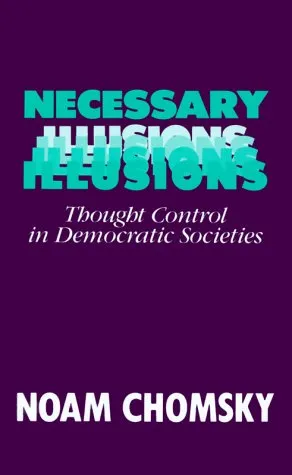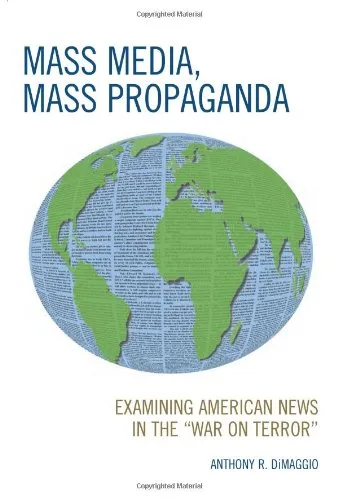Necessary Illusions- Thought Control In Democratic Societies
4.6
بر اساس نظر کاربران

شما میتونید سوالاتتون در باره کتاب رو از هوش مصنوعیش بعد از ورود بپرسید
هر دانلود یا پرسش از هوش مصنوعی 2 امتیاز لازم دارد، برای بدست آوردن امتیاز رایگان، به صفحه ی راهنمای امتیازات سر بزنید و یک سری کار ارزشمند انجام بدینکتاب های مرتبط:
خلاصه تحلیلی کتاب
کتاب Necessary Illusions- Thought Control In Democratic Societies اثر نوآم چامسکی، تحلیلی انتقادی از نقش رسانهها و ساختار قدرت در شکلدهی به افکار عمومی ارائه میدهد. این اثر به ما نشان میدهد که چگونه حتی در جوامعی که بهظاهر آزاد و دموکراتیک هستند، جریان اطلاعات تحت نفوذ نخبگان اقتصادی و سیاسی قرار دارد و این نفوذ به ابزاری برای ایجاد «توهمات ضروری» بدل میشود.
چامسکی در این کتاب دیدگاهی عمیق نسبت به فرایندهای کنترل ذهن در نظامهای دموکراتیک ارائه میکند. او سیستمهای خبری و رسانهای را بهعنوان بخشی از ساختار حاکم توصیف میکند که با تکنیکهای پروپاگاندا، چارچوب فکری شهروندان را هدایت میکنند تا دیدگاههای مطلوب حاکمان شکل گیرد. او با استفاده از مثالها و تحلیلهای مستند، نشان میدهد که این کنترل، نه از طریق سانسور آشکار، بلکه بیشتر با انتخاب گزینشی اخبار و روایتها اعمال میشود.
کتاب، جنبههای گوناگون این پدیده را تحلیل میکند؛ از نحوه ساخت خبر و تحلیل سیاسی، تا مکانیزمهای ظریف ایجاد توافق اجتماعی. مخاطبین جدی و پژوهشگران علوم اجتماعی در این اثر منابع و منطق تازهای برای واکاوی ساختارهای قدرت خواهند یافت.
نکات کلیدی و کاربردی
یکی از نکات اساسی که چامسکی در این کتاب مطرح میکند، این است که کنترل افکار در جوامع دموکراتیک بیشتر بهوسیله شکلدهی تدریجی به چارچوبهای فکری مردم انجام میشود، نه با اعمال فشار مستقیم یا سانسور کامل.
خواننده با مطالعه این کتاب درمییابد که شناخت منابع خبری، تحلیل رویکردهای خبرنگاران، و درک محدودیتهای ساختاری رسانهها، بخشی ضروری از فرهنگ سیاسی فعال است. این آگاهی به تحلیلگر یا پژوهشگر کمک میکند از پذیرش بیچونوچرای روایتهای رسمی پرهیز کند و به جستجوی منابع مستقل و نقد عمیق بپردازد.
چامسکی تأکید میکند که فرهنگ سیاسی سالم نیازمند رسانههای آزاد و پاسخگو است؛ اما این آزادی اغلب در فضای کسبوکار رسانهای و فشارهای سیاسی از بین میرود. همین موضوع ضرورت نقد مداوم و هوشیاری اجتماعی را برجسته میکند.
نقلقولهای ماندگار
در میان صفحات کتاب، جملههایی وجود دارد که بیانگر چکیدهای از تفکر نویسنده درباره رابطه رسانه، قدرت و جامعه هستند.
آزادی رسانه زمانی معنا دارد که همه صداها بتوانند شنیده شوند، نه فقط آنهایی که مطابق با منافع قدرت هستند.
نامشخص
کنترل افکار، ابزار پنهان قدرت در جوامع مدرن است.
نامشخص
برای درک واقعیت، باید روایتهای رسمی را با منابع مستقل به چالش کشید.
نامشخص
چرا این کتاب اهمیت دارد
این کتاب به دلیل ترکیب تحلیل نظری و شواهد عملی، منبعی ضروری برای دانشپژوهان علوم سیاسی، رسانه و مطالعات ارتباطات است. در جهانی که اطلاعات بهسرعت منتشر میشوند و روایتها لحظه به لحظه تغییر میکنند، فهم چگونگی شکلگیری این روایتها ارزش فوقالعادهای دارد.
اگرچه کتاب در دهههای پیش نوشته شده، مفاهیمی که مطرح میکند امروزه نیز کاربردیاند. از بررسی پوشش رسانهای جنگها تا تحلیل ساختار اقتصادی رسانهها، هر بخش کتاب ابزار تحلیلی قدرتمندی به دست خواننده میدهد تا نقش رسانه در زندگی سیاسی و اجتماعی را واقعبینانهتر ببیند.
این اثر همچنین پیامی فراتر از زمان و مکان دارد: نیاز به نقادی مستمر قدرت و بازنگری در فرضیات رایج، حتی در دموکراسیهایی که ادعای آزادی دارند.
نتیجهگیری الهامبخش
کت
Analytical Summary
In Necessary Illusions- Thought Control In Democratic Societies, Noam Chomsky presents a penetrating analysis of how information is manufactured, filtered, and distributed in ostensibly free societies. The book dissects the mechanisms through which media institutions and state apparatuses collaborate—often unconsciously—to frame reality in ways that preserve established power structures, curtail public dissent, and narrow the scope of democratic discourse.
Drawing on historical case studies, media reports, and the political economy of communication, Chomsky identifies systematic patterns in news coverage, editorial decision-making, and the construction of public opinion. The text explores how the media, while claiming neutrality and adherence to facts, frequently perpetuate narratives that align with elite interests.
Chomsky’s argument hinges on the observation that in liberal democracies, the consent of the governed is managed through subtle control over ideas rather than overt coercion. This “thought control” relies on the creation and reinforcement of “necessary illusions”—concepts and beliefs that, though presented as truth, mask underlying political agendas. The work is both an analytical treatise and a rallying call for active, critical engagement with the information environments we inhabit.
Key Takeaways
The lessons embedded in Necessary Illusions- Thought Control In Democratic Societies remain highly relevant for readers in academia, media, and politics.
Democratic societies are not immune to propaganda; rather, their media systems often achieve more sophisticated forms of influence than overtly authoritarian regimes.
Critical literacy—understanding who benefits from prevailing narratives—is essential for resisting manipulation within modern communication channels.
Media manipulation and controlled discourse impact public policy priorities, often invisibly, by shaping perceptions of what issues merit attention.
Public engagement and continuous questioning of official sources can counteract the impact of necessary illusions and foster genuine democratic participation.
Memorable Quotes
The smart way to keep people passive and obedient is to strictly limit the spectrum of acceptable opinion.Unknown
In democratic societies, coercion is replaced not by freedom, but by the subtle manufacturing of consent.Unknown
Why This Book Matters
The relevance of Necessary Illusions- Thought Control In Democratic Societies extends beyond its original audience, offering enduring insights into the structures of modern media and governance.
For journalists, policymakers, educators, and engaged citizens, Chomsky’s critique is an invaluable tool for identifying and dismantling the cognitive barriers that prevent meaningful democratic participation.
In an age defined by rapid information exchange and algorithmic news feeds, the ability to discern media manipulation becomes not only a professional skill but a civic duty. The book’s examination of democratic discourse challenges the complacency that can set in when the media landscape appears pluralistic yet functions within narrow ideological bounds.
Inspiring Conclusion
Necessary Illusions- Thought Control In Democratic Societies is more than a scholarly work; it is an invitation to interrogate the beliefs and assumptions we take for granted.
By exposing the subtle mechanisms of thought control in liberal democracies, the book empowers readers to reclaim their intellectual agency. This empowerment is not merely an academic exercise—it is a call to action for informed participation in civic life, responsible media consumption, and the cultivation of public discourse that resists manipulation.
For academics, professionals, and engaged citizens alike, the next step is clear: read the book, share its insights, and discuss its implications with peers, communities, and networks. In doing so, we collectively chip away at the necessary illusions that constrain democratic potential.
دانلود رایگان مستقیم
شما میتونید سوالاتتون در باره کتاب رو از هوش مصنوعیش بعد از ورود بپرسید
دسترسی به کتابها از طریق پلتفرمهای قانونی و کتابخانههای عمومی نه تنها از حقوق نویسندگان و ناشران حمایت میکند، بلکه به پایداری فرهنگ کتابخوانی نیز کمک میرساند. پیش از دانلود، لحظهای به بررسی این گزینهها فکر کنید.
این کتاب رو در پلتفرم های دیگه ببینید
WorldCat به شما کمک میکنه تا کتاب ها رو در کتابخانه های سراسر دنیا پیدا کنید
امتیازها، نظرات تخصصی و صحبت ها درباره کتاب را در Goodreads ببینید
کتابهای کمیاب یا دست دوم را در AbeBooks پیدا کنید و بخرید
1240
بازدید4.6
امتیاز50
نظر98%
رضایتنظرات:
4.6
بر اساس 0 نظر کاربران
"کیفیت چاپ عالی بود، خیلی راضیام"
Questions & Answers
Ask questions about this book or help others by answering
No questions yet. Be the first to ask!



